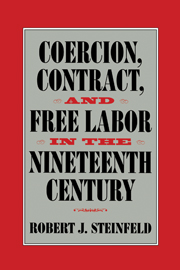Book contents
- Frontmatter
- Contents
- List of Illustrations and Tables
- Acknowledgments
- Introduction: Free Wage Labor in the History of the West
- PART ONE AMERICAN CONTRACT LABOR AND ENGLISH WAGE LABOR: THE USES OF PECUNIARY AND NONPECUNIARY PRESSURE
- 1 “Free” Contract Labor in the United States: An Anti-essentialist View of Labor Types I
- 2 “Unfree” Wage Labor in Nineteenth-Century England: An Anti-essentialist View of Labor Types II
- 3 Explaining the Legal Content of English Wage Labor
- 4 Struggles over the Rules: The Common Law Courts, Parliament, the People, and the Master and Servant Acts
- 5 Struggles under the Rules: Strategic Behavior and Historical Change in Legal Context
- 6 Struggles to Change the Rules
- 7 Freedom of Contract and Freedom of Person
- PART TWO “FREE” AND “UNFREE” LABOR IN THE UNITED STATES
- Conclusion
- Index
4 - Struggles over the Rules: The Common Law Courts, Parliament, the People, and the Master and Servant Acts
Published online by Cambridge University Press: 06 July 2010
- Frontmatter
- Contents
- List of Illustrations and Tables
- Acknowledgments
- Introduction: Free Wage Labor in the History of the West
- PART ONE AMERICAN CONTRACT LABOR AND ENGLISH WAGE LABOR: THE USES OF PECUNIARY AND NONPECUNIARY PRESSURE
- 1 “Free” Contract Labor in the United States: An Anti-essentialist View of Labor Types I
- 2 “Unfree” Wage Labor in Nineteenth-Century England: An Anti-essentialist View of Labor Types II
- 3 Explaining the Legal Content of English Wage Labor
- 4 Struggles over the Rules: The Common Law Courts, Parliament, the People, and the Master and Servant Acts
- 5 Struggles under the Rules: Strategic Behavior and Historical Change in Legal Context
- 6 Struggles to Change the Rules
- 7 Freedom of Contract and Freedom of Person
- PART TWO “FREE” AND “UNFREE” LABOR IN THE UNITED STATES
- Conclusion
- Index
Summary
English legal history is generally of two kinds, common law and statutory. The history of common law is usually devoted to following the development of legal doctrine in the decisions of the common law courts. Statutory history is generally quite different, devoted to parliamentary politics or to politics in the country, with the object of laying bare the circumstances mat produced a particular piece of legislation. Often the legislation is described in detail, and its subsequent history (amendments, repeals, etc.) is retold. Rarely does one find a statutory history in which the common law courts play a significant role. Almost never does one find a statutory history in which parliament repeatedly reacts to modify judicial interpretations of a previously passed statute. One supposes that this convention of English legal history flows from the fact of parliamentary sovereignty, which makes the legislative body supreme and the courts subservient to it, at least insofar as legislation is concerned. In the case of the Master and Servant acts, this convention of legal history writing has obscured an important part of the story. For centuries, the common law courts played a significant role in the legal development of the Master and Servant acts, and in a number of instances Parliament took steps to try to reverse court decisions by passing additional legislation.
From the late seventeenth century on, we find a steady stream of cases devoted to the question of whether justices of the peace possessed jurisdiction under the Tudor Statute of Artificers to hear wage recovery complaints brought by workers against employers.
- Type
- Chapter
- Information
- Coercion, Contract, and Free Labor in the Nineteenth Century , pp. 102 - 166Publisher: Cambridge University PressPrint publication year: 2001



